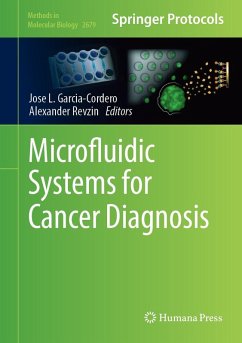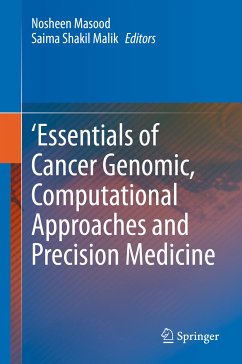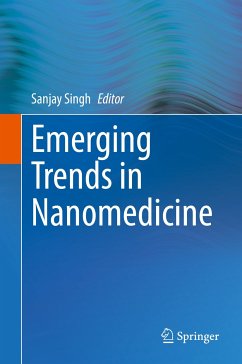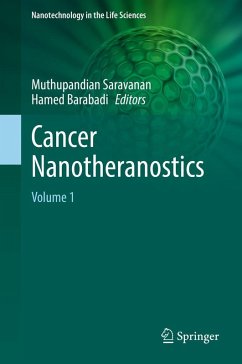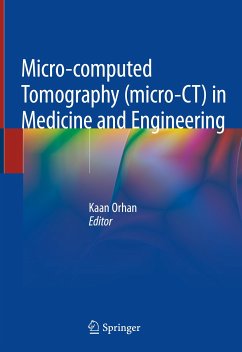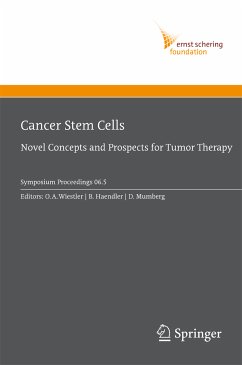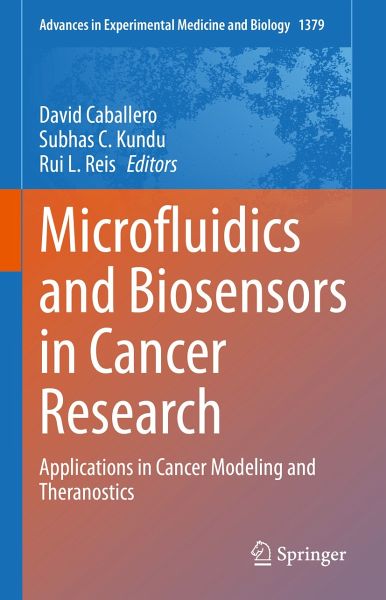
Microfluidics and Biosensors in Cancer Research (eBook, PDF)
Applications in Cancer Modeling and Theranostics
Redaktion: Caballero, David; Reis, Rui L.; Kundu, Subhas C.
Versandkostenfrei!
Sofort per Download lieferbar
128,95 €
inkl. MwSt.
Weitere Ausgaben:

PAYBACK Punkte
64 °P sammeln!
This book offers a comprehensive overview of the development and application of microfluidics and biosensors in cancer research, in particular, their applications in cancer modeling and theranostics.Over the last decades, considerable effort has been made to develop new technologies to improve the diagnosis and treatment of cancer. Microfluidics has proven to be a powerful tool for manipulating biological fluids with high precision and efficiency and has already been adopted by the pharmaceutical and biotechnology industries. With recent technological advances, particularly biosensors, microfl...
This book offers a comprehensive overview of the development and application of microfluidics and biosensors in cancer research, in particular, their applications in cancer modeling and theranostics.
Over the last decades, considerable effort has been made to develop new technologies to improve the diagnosis and treatment of cancer. Microfluidics has proven to be a powerful tool for manipulating biological fluids with high precision and efficiency and has already been adopted by the pharmaceutical and biotechnology industries. With recent technological advances, particularly biosensors, microfluidic devices have increased their usefulness and importance in oncology and cancer research.
The aim of this book is to bring together in a single volume all the knowledge and expertise required for the development and application of microfluidic systems and biosensors in cancer modeling and theranostics. It begins with a detailed introduction to the fundamental aspects of tumor biology, cancer biomarkers, biosensors and microfluidics. With this knowledge in mind, the following sections highlight important advances in developing and applying biosensors and microfluidic devices in cancer research at universities and in the industry. Strategies for identifying and evaluating potent disease biomarkers and developing biosensors and microfluidic devices for their detection are discussed in detail. Finally, the transfer of these technologies into the clinical environment for the diagnosis and treatment of cancer patients will be highlighted.
By combining the recent advances made in the development and application of microfluidics and biosensors in cancer research in academia and clinics, this book will be useful literature for readers from a variety of backgrounds. It offers new visions of how this technology can influence daily life in hospitals and companies, improving research methodologies and the prognosis of cancer patients.
Over the last decades, considerable effort has been made to develop new technologies to improve the diagnosis and treatment of cancer. Microfluidics has proven to be a powerful tool for manipulating biological fluids with high precision and efficiency and has already been adopted by the pharmaceutical and biotechnology industries. With recent technological advances, particularly biosensors, microfluidic devices have increased their usefulness and importance in oncology and cancer research.
The aim of this book is to bring together in a single volume all the knowledge and expertise required for the development and application of microfluidic systems and biosensors in cancer modeling and theranostics. It begins with a detailed introduction to the fundamental aspects of tumor biology, cancer biomarkers, biosensors and microfluidics. With this knowledge in mind, the following sections highlight important advances in developing and applying biosensors and microfluidic devices in cancer research at universities and in the industry. Strategies for identifying and evaluating potent disease biomarkers and developing biosensors and microfluidic devices for their detection are discussed in detail. Finally, the transfer of these technologies into the clinical environment for the diagnosis and treatment of cancer patients will be highlighted.
By combining the recent advances made in the development and application of microfluidics and biosensors in cancer research in academia and clinics, this book will be useful literature for readers from a variety of backgrounds. It offers new visions of how this technology can influence daily life in hospitals and companies, improving research methodologies and the prognosis of cancer patients.
Dieser Download kann aus rechtlichen Gründen nur mit Rechnungsadresse in A, B, BG, CY, CZ, D, DK, EW, E, FIN, F, GR, HR, H, IRL, I, LT, L, LR, M, NL, PL, P, R, S, SLO, SK ausgeliefert werden.



